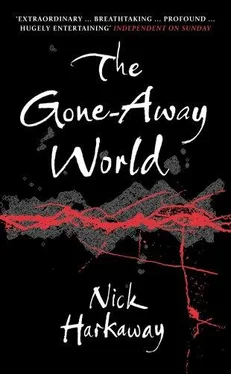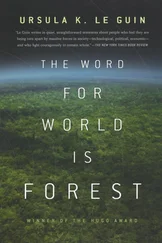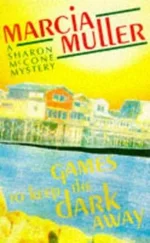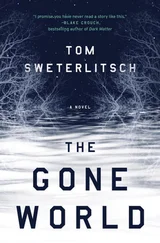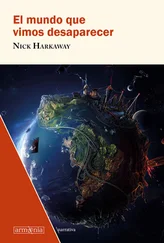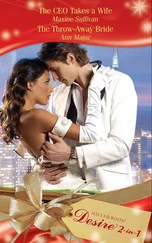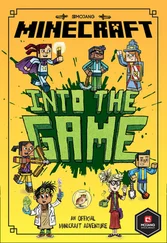Nick Harkaway - The Gone-Away World
Здесь есть возможность читать онлайн «Nick Harkaway - The Gone-Away World» весь текст электронной книги совершенно бесплатно (целиком полную версию без сокращений). В некоторых случаях можно слушать аудио, скачать через торрент в формате fb2 и присутствует краткое содержание. Жанр: Фантастика и фэнтези, Фэнтези, на английском языке. Описание произведения, (предисловие) а так же отзывы посетителей доступны на портале библиотеки ЛибКат.
- Название:The Gone-Away World
- Автор:
- Жанр:
- Год:неизвестен
- ISBN:нет данных
- Рейтинг книги:4 / 5. Голосов: 1
-
Избранное:Добавить в избранное
- Отзывы:
-
Ваша оценка:
- 80
- 1
- 2
- 3
- 4
- 5
The Gone-Away World: краткое содержание, описание и аннотация
Предлагаем к чтению аннотацию, описание, краткое содержание или предисловие (зависит от того, что написал сам автор книги «The Gone-Away World»). Если вы не нашли необходимую информацию о книге — напишите в комментариях, мы постараемся отыскать её.
The Gone-Away World — читать онлайн бесплатно полную книгу (весь текст) целиком
Ниже представлен текст книги, разбитый по страницам. Система сохранения места последней прочитанной страницы, позволяет с удобством читать онлайн бесплатно книгу «The Gone-Away World», без необходимости каждый раз заново искать на чём Вы остановились. Поставьте закладку, и сможете в любой момент перейти на страницу, на которой закончили чтение.
Интервал:
Закладка:
And then there comes the day when Master Wu and I are mixed in a blur of limbs and actions and reactions (“Newton! Very good gong fu !”) and I see an opening and I strike sharply into it and even as I do so I am thinking that I have made a mistake, and of the gramophone and my horror at the notion of harming it, and at how ghastly and impossible it would be if I struck my teacher and damaged him, even to the extent of a bruised head, and God forbid I should break his skin. At which point his left hand gently but firmly captures my fist, and his right, driven by the same motion turning around the fulcrum at the base of his spine, borrowing my force for his purpose, propels me through the air and into the ornamental fish pond, which causes Master Wu and half a dozen senior students to laugh so hard they nearly rupture, and my relief and my delight at the cheeky old sod are so great that I have to be helped out before I drown. But Master Wu is more delighted because he is also proud.
“Excellent! You won!”
“I fell in the pond!” I object, but he shakes his head.
“You made me misjudge! You were fast! I had to do something I did not intend!” He grins. “Do you think you found out what the Secret means? Maybe you very nearly merged your chi with mine! Then you’d have to teach me!” He laughs, and he is glowing, and so am I. From the sun deck, Elisabeth is watching, her face completely still, and she fetches a towel for me, which I know is a high honour indeed.
“Does anyone ever really win? Do they even get close?” I ask Master Wu that evening, as he swings his legs over the edge of the little bridge at the bottom of his garden and cools his feet in the water.
“Oh, they get close all the time,” he says, “but they never know that they are close and I never tell.”
“You told me!”
“Once! Not again. Now you must work it out like the others! Yes? Yes! For everyone the instruction they need, all of it, but no more.” He smiles. “I have one student who might beat me. But he doesn’t.”
“Why not?”
“Maybe he thinks that’s what I need—and what the other students need: for me to go to my grave as the teacher who couldn’t lose.” He grins. “But more likely he is too scared to try in case he is wrong.” He laughs, loudly, and splashes me with his foot.
A week later, Alan Lasserly’s teacher knocks very politely on the door of the House of the Voiceless Dragon, and watches Master Wu teach Ophelia for half an hour. He watches Master Wu’s feet and his hands and the way he steps, and he watches Master Wu’s index finger touch Ophelia behind the knee so that her whole body falls into line and she looks like a little fighting woman and not a small girl playing at gong fu. When Yumei reclaims her daughter and takes her off for milk, Mr. Hampton bows very low to Master Wu and thanks him for the lesson. Master Wu says Mr. Hampton is very welcome, and Mr. Hampton says that he wishes he had known Master Wu when he was Ophelia’s age, to which Master Wu responds that when Mr. Hampton was Ophelia’s age, Master Wu was a wild and intemperate youth much given to drinking and taking off his trousers in public places. Mr. Hampton smiles and says that he supposes this is not impossible, and Master Wu avers that there are photographs to prove it, although no one will ever see them. Mr. Hampton says that is probably for the best. They drink tea. After enquiring as to the good health of Mr. Hampton’s family and friends, Master Wu asks after Mr. Lasserly. Mr. Hampton says that Mr. Lasserly is sadly still an idiot, and they both find this lamentable and extremely amusing.
IT IS on the evening after Mr. Hampton’s visit that I notice the bells for the first time. Seeing them, I realise they have always been there, that they are as much a part of the room as the china ducks—but they are different from the ducks because they are very deliberate. Amid the clutter of Master Wu’s life, the bells stand out because they are structured.
Elisabeth and Master Wu and I are loafing. We have eaten a muddled sort of meal, cake and cheese and fruit, and slices of salami, and Elisabeth and Master Wu are discussing the matter of China’s space programme. The discussion is quite animated. They have co-opted the butter dish (the Moon), the cake plate (the Earth) and a mango (the Sun, acknowledged to be much further away and not to scale, but equally a necessary component in their orrery), and currently Master Wu is waving a spoon, which symbolises the Apollo rockets. The gist of his argument is that the Moon is up in the sky, and America (as evidenced by European and American maps) is on the top half of the world. The journey from the United States to the Moon is therefore considerably shorter than the journey from China, which is (as evidenced by European and American maps) on the bottom half of the world. It is therefore absolutely consonant with his contention that China, despite her flaws, is the most advanced nation on Earth, that the Americans should reach the Moon before the Chinese. They simply did not have to work as hard.
Elisabeth is stumped by this contention on two fronts. In the first place, it is balderdash, of a sort which is so fundamentally wrong-headed as to be hard to argue. In the second, she cannot shake the nagging suspicion that her revered teacher knows full well the measure of this wrong-headedness, and is gently stringing her along to stretch her cultural preconceptions, is in fact taking the piss. She sputters for a moment.
Initially, this whole thing was grand sport. I tuned back in for a while and even suggested that the American rocketeers were at a disadvantage because the Earth was spinning, and they had to build a ship which could go really quickly so as to reach the Moon before it passed by overhead, whereas the Chinese had longer to make course corrections, owing to the greater distance. Master Wu brushed this aside as a minor consideration and Elisabeth seemed to regard it as treachery, and back and forth they went, Master Wu twinkling and vexatious, and Elisabeth in one of her moments of doubt. These are fun to watch, because they are extremely rare. Elisabeth’s fundamental attribute is certainty. However, after the debate over the positioning of the mango and whether it should affect the arrangement of the cake plate and whether in fact the mango should be replaced with an object several miles away and about the size of a house, I sort of drifted off again and I am now viewing the room with new eyes, or at least, with eyes which are paying attention to the detail.
Everything is familiar, of course. I have sat here countless times since I first saw the overstuffed furniture and the weapons on the walls, and fell in love with the gramophone. At this moment, I am looking at the window frames. I have not, until now, spent a lot of time doing this, but a long day and a lot of gong fu followed by cake (planet Earth) and tea (either a non-relevant experimental error or a terrifying cosmological event even now threatening to upset the gravitational balance of the solar system) have produced in me a state of contemplative calm and watchfulness. I have studied Master Wu’s mouth, and concluded that the occasional twitch of his upper lip is in fact a quirk, and evidence in favour of the supposition that he is winding us up. I have studied Elisabeth’s upper lip and concluded that it is a fine specimen of the kind, slender and pale pink and slightly masked by a wisp of icing sugar. And so now I have turned my attention upward and outward.
The window frames are made of a darkened wood, which has a fine sheen of varnish over it, and the edges are crusty with yellow, resiny stuff. This is probably where the treated wood has sweated over the years. If I were to touch it, it would feel smooth and shiny and slightly flexible, and then it would snap like crystal sugar. The glass is old and ever so slightly distorted. Glass is mysterious. I once heard Mr. Carmigan, the chemistry teacher, discussing it with Ms. Folderoi, the art mistress. Mr. Carmigan asserted that glass is still technically a liquid, slowly but inevitably obeying gravity as the years pass, while Ms. Folderoi said it isn’t and it doesn’t. Mr. Carmigan replied that neither of them would live long enough to make a personal empirical observation. Ms. Folderoi hit him with an oil sponge. The debate—like the one unfolding in front of me now—was irascible but good-natured. Also like the one in front of me now, it was one in which I took scant interest. I ponder the window again.
Читать дальшеИнтервал:
Закладка:
Похожие книги на «The Gone-Away World»
Представляем Вашему вниманию похожие книги на «The Gone-Away World» списком для выбора. Мы отобрали схожую по названию и смыслу литературу в надежде предоставить читателям больше вариантов отыскать новые, интересные, ещё непрочитанные произведения.
Обсуждение, отзывы о книге «The Gone-Away World» и просто собственные мнения читателей. Оставьте ваши комментарии, напишите, что Вы думаете о произведении, его смысле или главных героях. Укажите что конкретно понравилось, а что нет, и почему Вы так считаете.
